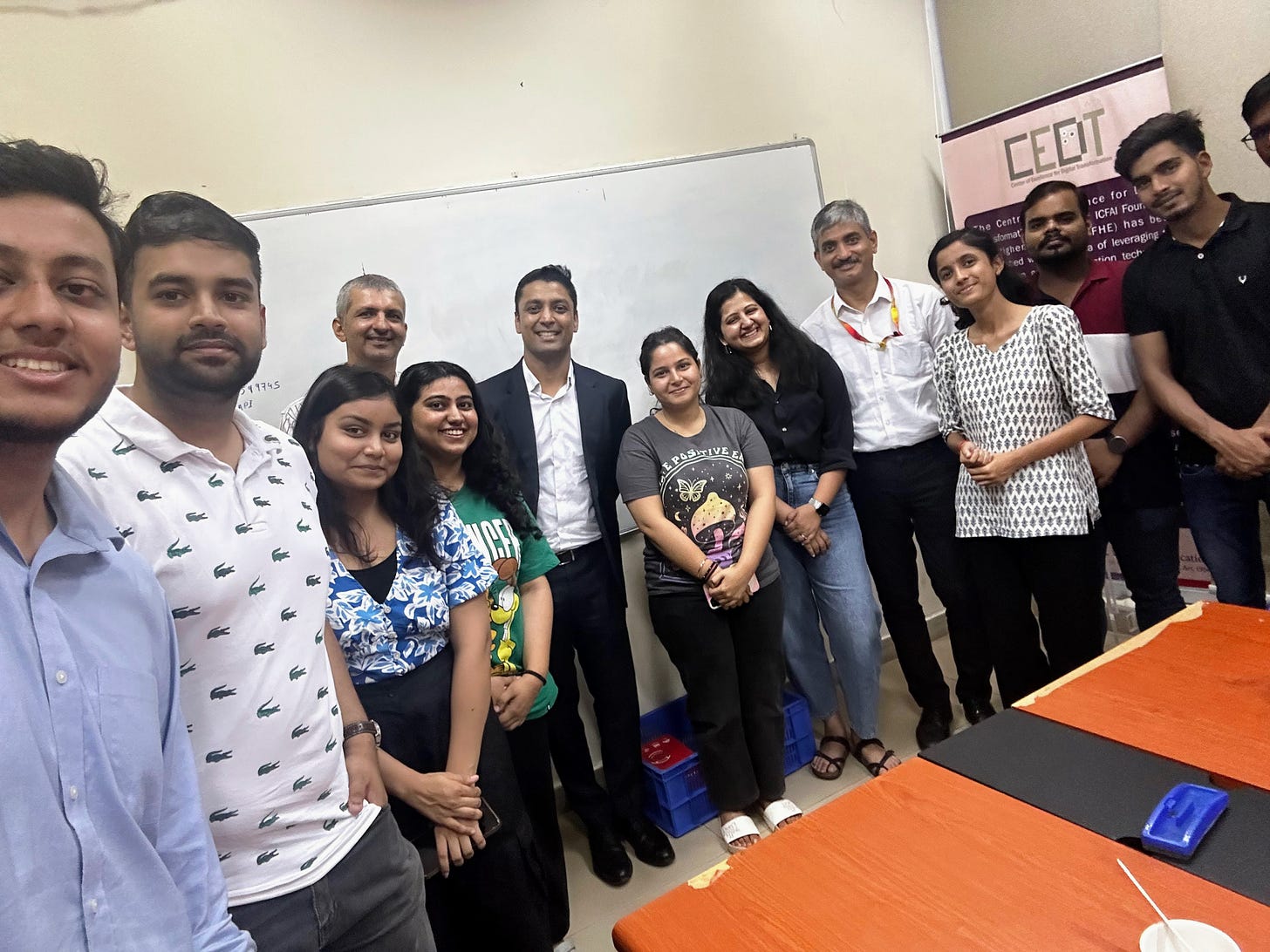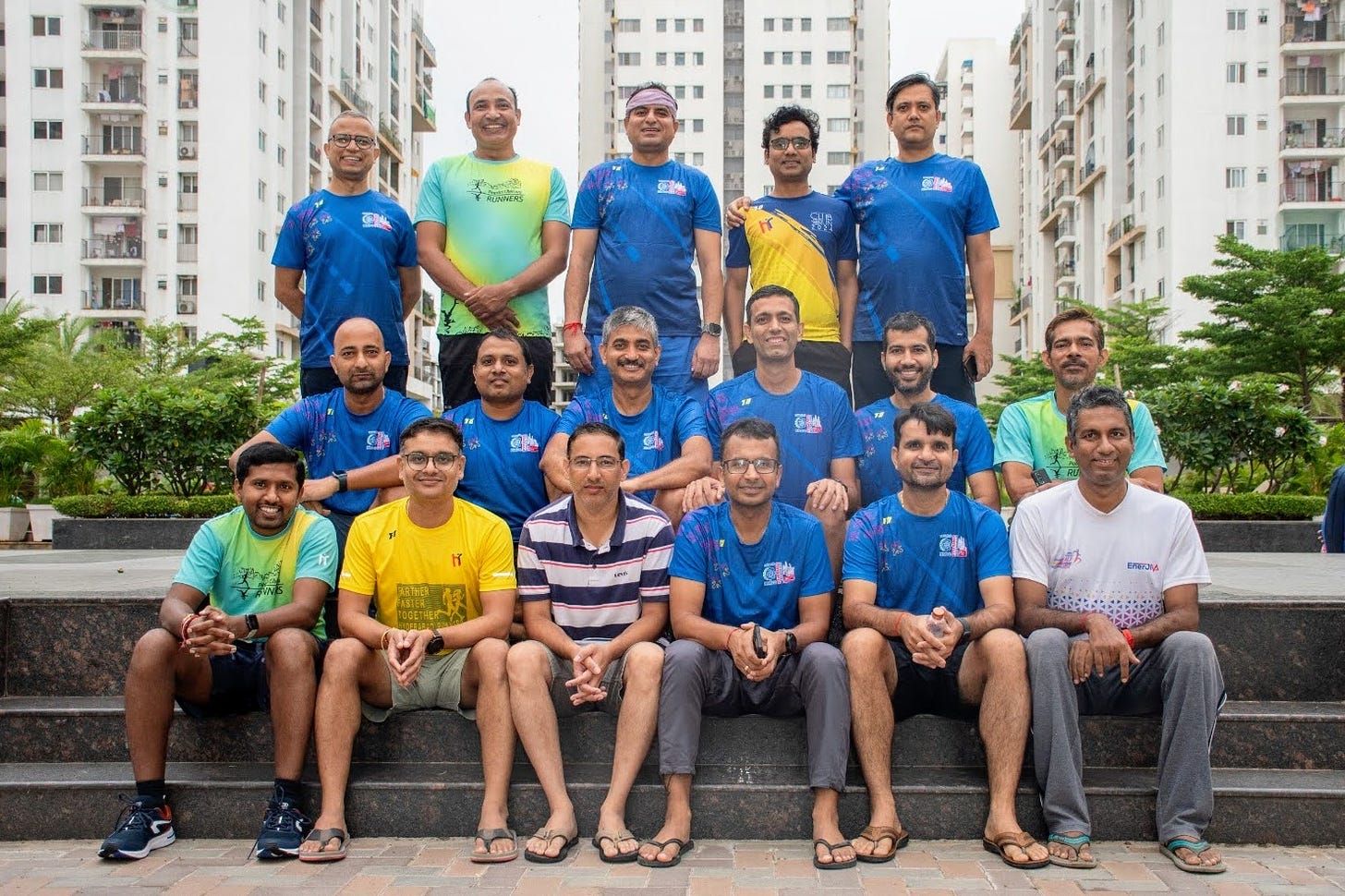A heartfelt thank you to our esteemed alumni, Rajat Mittal and Shalini Jha, for sharing their invaluable insights on Key Account Management in Real Estate Consulting during our Business Marketing class at IBS Hyderabad.
Your extensive experience and practical perspectives have truly enriched the learning journey of our students. It was also a reminder that life offers second chances. A career change offers a fresh start. It can align your work with passions, develop new skills, and open doors to new opportunities. It's a chance to pursue dreams and find personal fulfillment, even if you feel like you've missed your chance. It's a reminder that it's never too late to start over.
Before we dive in further, if you are reading for the first time, please subscribe for a weekly email discussing Running Platform Marketing Life.
AND if you are a friend of the RPML, do share it with others. You can add more of your friends to the Community of Platform’ed by using the following link.
Do share your feedback on this newsletter if you have not done it yet.
DTW
During the Week, Google's deal with California to fund local journalism was criticized by journalists and industry experts. The deal, totaling $250 million, will provide money to two efforts: funding for journalism initiatives and a new AI research program. The agreement only guarantees funding for a period of five years.
Critics argue that the deal primarily benefits Google and doesn't provide sufficient funding for news outlets. The deal was reached after California abandoned a bill that would have required tech companies to pay publishers for linking to their content. While Google supports the deal, many believe it's a tactic to avoid regulations and maintain dominance over local news. It also highlights the pivot of news organisation as a partner with google rather be seen as a commodified supplier. It could also be seen as a second wind for the news organisation as they look for different business models in an era where news is becoming more digital and use generated than print and/or newsroom driven. We have discussed about the digital transformation of news media in an earlier issue.
The interplay between news media and digital platforms continues to evolve, with platforms acting as Information Gatekeepers, Engagement Catalysts, and Truth Arbitrators. This complex relationship accentuated by digital transformation of news and entertainment industry highlights the need for a balanced approach to regulation, ensuring platforms contribute positively to the news ecosystem while safeguarding public trust and integrity.
In the early 2000s, digital transformation (DX) was heralded as the future of business, promising to revolutionize industries through technology-led modernization. However, as digital transformation gained momentum, the focus often drifted from true transformation to mere digitization—upgrading systems without fundamentally rethinking business models. Fast forward to the rise of generative AI, which has exposed the limitations of earlier digital transformation efforts and is now offering companies a second wind to achieve the transformative outcomes they initially sought.
The advent of generative AI, particularly since the groundbreaking release of OpenAI’s ChatGPT in 2022, has forced executives to reevaluate the effectiveness of their digital transformation investments. Where digital transformation often fell short—by focusing more on technology upgrades than on business model innovation—generative AI provides a unique opportunity to recalibrate and pursue a deeper, more impactful transformation.
Generative AI is not just another tool in the tech stack; it is a catalyst for reimagining how businesses operate, innovate, and create value. Unlike the digitization efforts that characterized many digital transformation projects, generative AI empowers companies to move beyond optimization and into augmentation—creating entirely new capabilities, products, and business models.
To harness the full potential of generative AI, businesses need more than just the technology itself; they require a robust platform strategy. Platforms serve as the foundational infrastructure that connects disparate technologies, data sources, and business processes, enabling seamless integration and collaboration. They provide the flexibility and scalability needed to experiment with generative AI applications and to rapidly iterate on new business models.
Platform as a Service (PaaS): Cloud-based platforms like Amazon Web Services (AWS), Microsoft Azure, and Google Cloud Platform (GCP) offer the computing power, storage, and AI tools necessary for businesses to build, test, and deploy generative AI solutions at scale. These platforms also provide the APIs and microservices that facilitate the integration of AI capabilities into existing systems, allowing companies to leverage their previous digital transformation investments while charting new paths forward.
Ecosystem Platforms: Companies like Tesla, Amazon, and Alibaba have shown how ecosystem platforms can drive innovation by bringing together a diverse set of stakeholders—customers, suppliers, developers, and even competitors—into a single, interconnected environment. Generative AI thrives in such ecosystems, where data flows freely, and collaboration across organizational boundaries is the norm. By adopting an ecosystem platform approach, companies can unlock new opportunities for innovation, customer engagement, and value creation.
Data Platforms: Generative AI is inherently data-driven, relying on vast amounts of information to generate insights, predictions, and creative outputs. A robust data platform is essential for collecting, storing, and analyzing the data that fuels AI models. Companies that have already invested in digital transformation likely have significant data assets; now, they must focus on refining their data platforms to ensure they can support the advanced analytics and machine learning capabilities that generative AI requires.
We need a new mindset that involves moving our focus from mere Digitization to true Transformation. I think that to fully capitalize on the second wind offered by generative AI, companies must adopt a new mindset—one that prioritizes business model innovation over incremental improvements. This requires rethinking not just how technology is deployed, but also how businesses are structured, how they create and deliver value, and how they compete in an increasingly digital-first world.
Leadership Involvement: Unlike the earlier wave of digital transformation, which was often driven by CIOs and technology teams, the current shift towards generative AI is being led by CEOs and CFOs. This executive involvement is crucial for aligning AI initiatives with broader business goals and ensuring that the necessary resources—financial, human, and technological—are allocated to drive real transformation.
Cultural Shift: A successful pivot towards generative AI requires a cultural shift within organizations. Employees at all levels must be encouraged to embrace change, experiment with new ideas, and learn new skills. This is particularly important for companies that struggled with digital transformation, as resistance to change and a lack of cross-functional collaboration were common obstacles.
Strategic Roadmaps: To avoid the pitfalls of the past, companies must develop clear, strategic roadmaps for their AI initiatives. These roadmaps should be aligned with the company’s vision, goals, and market dynamics, and should include realistic timelines, adequate resources, and a commitment to continuous learning and adaptation.
As discussed in an article by Brian Solis (Global Head of Innovation at ServiceNow), the combination of generative AI-powered augmentation and automation represents the path forward for companies seeking to realize the full potential of their digital transformation investments.
Augmentation: This involves using generative AI to enhance human capabilities, enabling employees to focus on higher-value tasks and driving innovation in products and services. For example, AI can assist in product design, customer service, and strategic decision-making, unlocking new opportunities for growth and differentiation.
Automation: While augmentation focuses on creating new value, automation aims to improve efficiency and reduce costs by streamlining repetitive tasks. Generative AI can automate a wide range of processes, from data entry to complex decision-making, allowing businesses to scale more effectively.
Generative AI offers a unique opportunity for companies to achieve the true transformation that digital initiatives initially promised but often failed to deliver. By embracing a platform-based approach, companies can integrate generative AI into their core operations, enabling both automation and augmentation, and ultimately driving business model innovation.
This second wind is not just about doing digital better; it’s about rethinking the very foundations of business—how value is created, delivered, and captured. Companies that seize this opportunity will not only enhance their competitiveness in the short term but also position themselves to thrive in a future where AI-driven innovation is the norm.
One of the important industry that could benefit a lot from the advanced use of augmentation and automation using Generative AI is Logistics and Supply Chain Management. In fact, it was a point brought out during our fortnightly Digital Transformation Colloquium focused on Supply Chain Management and Logistics organised by Centre of Excellence for Digital Transformation at ICFAI Foundation for Higher Education, Hyderabad. Our speakers, Prashant Singh (Strategy Consultant, PwC), Amit Choudhary (Installed Base Global Process Leader, GE Vernova), and RISHI PRAKASH (Solutions Architect & Product Owner, BlueYonder) spoke about how Generative AI is revolutionizing logistics and supply chain management by improving efficiency, reducing costs, enhancing customer experience, and mitigating risks through advanced applications like demand forecasting, transportation optimization, warehouse automation, and supply chain visibility.
A special congratulations to our MBA students, Anuja Barnwal and Nikhil Varghese from the Managing Digital Transformation course, for their excellent opening remarks. Kudos to participants from the Maverick IBS and Club ADmire IBS Hyderabad of IBS Hyderabad Official for their active involvement.
Thanks to Prof. Sanjay Fuloria Ph.D. for expertly moderating the session.
The rise of generative AI may mark the end of digital transformation as we know it, ushering in a new era of business model transformation that will shape the future of industries worldwide.
OTW
Over the Weekend, I completed my 17th Full Marathon during the NMDC Hyderabad Marathon 2024.


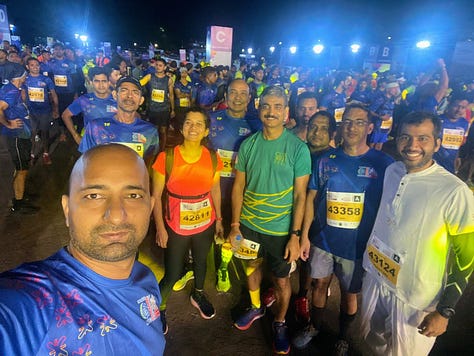
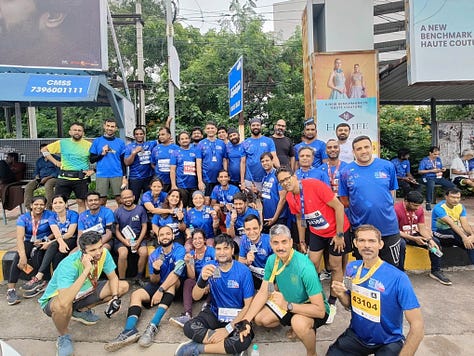

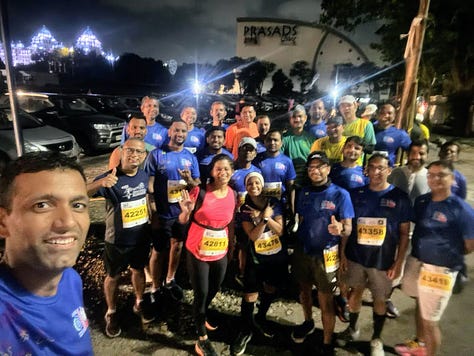
It was great experience for prepare for the marathon over last 16 weeks and you would have read about the updates in the earlier newsletters. This year saw a very large Full Marathon contingent from Peerancheruvu Runner Group including many first timers.
Crossing the finish line in my hometown marathon is always a surreal experience. The cheers from familiar faces on the course and finish line, the sense of accomplishment, and the pride of being part of the toughest and most well organised city marathon is unmatched. Even though it was my 17th Full marathon, I almost hit that familiar wall in the later part of the run—the miles where every step felt like a battle. But then, just when I thought I couldn’t go on, I found my second wind. It was an unexpected surge of energy, a reminder of why I love this sport. Despite the fatigue and the doubts creeping in, that renewed strength pushed me through those grueling miles, helping me finish stronger than I ever imagined. Life and marathon do give second chances, you just have to be ready!
Hope to see you soon at another start line.
I Love You
Shailendra




